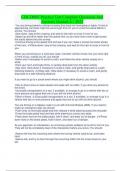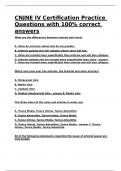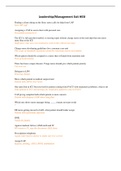Introduction to International Relations
Important terms
Lists of important stuff
Recap/Summary/Conclusions // Extra notes about something non-substantively
Lecture 1: What is ‘International Relations’? Defining the field and its constituent
actors
What a time to study international relations..
- China coming up as a new hegemon and US losing hegemony?
- Brexit → Loss of MS for the European Union
- Improvement of relations between North Korea and South Korea
- Iranian Nuclear Programme: balance of power in the east and between Iran-US
- Syrian war
- Migration crisis
- Rise of nationalist and populist countries in EU and all around the world
- COVID-19 > Vaccine distribution
- Climate change > COP 26
All these things influence each other and the situations in other (EU) countries.
International relations as practice (actors):
1. Meeting between different important people / countries
2. Supranational actors: UN, Security councils; using VETO
3. European Parliament: influences national legislation: issues around legitimacy and
accountability but still a very important party. Also very influential for the outside
European Market; by f.a. setting product standards.
4. Leaders getting together informally and discussing subjects.
5. NGO’s: these also frame ideas on subjects and agenda setting.
6. Businesses exhausting other states by outsourcing
7. Social movements (for example BLM)
So, it is not only relations between nations.
International relations as a science:
“a broad field of study that analyses interactions between states, citizens, intergovernmental
organisations and non-state actors at local, national and supranational levels, and that today
is predominantly concerned with comprehending the political nature, direction and
consequences of globalisations”
So in short: it is about…
1. Interactions
2. Various types of actors
3. Various levels of analysis
4. Globalisation
1
,Object of study of IR: Political, economic and social issues of which character, causes and
consequences exceed and transcend national borders
We ask ourselves the questions, how do these issues impact:
1. Relations between states?
2. Relations between state, inter-state and non-state actors?
3. How does the interaction between levels of collectivity → decision making
A very short history of modern IR
The international state system is a product of European civilisation. However, before
Europe’s dominance: various other civilisations such as Arabs, China, Japan, Aztecs, Incas,
African hegemons such as Ghana.
Europe around 1500:
1. Italian city states (such as Florence, Venice, Verona), having state-like interactions
with each other; trade relations, foreign policies, ambassadors
2. Hanseatic League (Germany, Poland, NL): trading cities offered protection to each
other's traders; protection along trade routes. Network of cities.
3. Feudal areas merge into arthurian kingdoms, with the emergence of modern
mercenary armies (which led to wars for territory, resources)
4. Beginning of great Voyages of Discovery very European perspective because there
were already inhabitants so it was already ‘discovered’ by them
Peace of Westphalia (1648) = Peace of Münster: treaty between many powers which ends
Thirty Years war and the Eighty Years War
+ First time Dutch independence recognized by Kingdom of Spain
Formalises fundamental principles of modern IR:
● Sovereignty
● Territorial Integrity
● Non-intervention
● Cuius Regio, Eius Religio (1555)
18th century:
- Rise of the UK (because of industrial revolution), Russia (large state), Prussia
(unification of some german state into a larger area)
- American and French Revolutions: leading of state does not come from god but has
to come from the citizens; equality and freedom
19th century
- Napoleonic wars
- Congress of Vienna 1815: the concert of Europe (Britain, Russia, Prussia, Austria,
and (after 1818) France): one of the first attempts to establish regular negotiations
between the great powers at the time to talk about the issues of war and peace;
consulting each other regularly about the balance of power, keep military powers
equal.
- Outside of Europe; British hegemony
2
,End of 19th century which put pressure on this relatively order and stability:
1. Erosion of British hegemony: Germany, France became even more important in
innovations than the UK
2. Bismarck Unites Germany: Bismarck's alliance policies were very different from the
balances of power. Triple Entente (UK, France, Russia) and Triple Alliance
(Germany, Italy, Austria-Hungary).
3. Rise of US, Italy and Japan: world becomes more multi-polar and less secure
4. Scramble for Africa: European powers divided Africa literally: Berlin colonial
conference > European powers tried to squeeze as much money and sources out of
a country as possible, because the idea was if they didn’t then another European
country would.
World War I (1914-1918): Prinz Princip was attacked and because of the alliances a military
conflict happened within a few weeks.
> End century of relatively peaceful relations in Europe
The Interwar period (Interbellum)...
Treaty of Versailles, 1919
- Wilson’s ‘Fourteen Points’ speech
- world based on peace and stability
- principle of self-determination
- principle of free trade; when countries trade they have less reason to fight
- international relations should be transparent and out in the open
- League of Nations: attack on one of the powers would be seen as an attack
on the entire league of nations.
- Germany severely punished
Interbellum – Great Depression: Wall street crash Sep 1919
>> led into World War II (1939-1945). Crash (US pulled back many loans from Germany) +
Reparation costs for Germany led to deep economic problems.
Establishment of the United Nations,1945: come together and restore peace and security.
Based on the idea we have 2 kinds of powers in the world: we have great powers and other
powers and the great ones should have more power. Security council: 5 standard seats are
the victorers of the WWII
Cold War (1947-1991)
1. Bipolar World Order (lot of fear because of a very high military power conflict)
2. Proxy wars (vietnam, chile, guatemala)
3. Decolonisation
After the Berlin wall falls down..
‘Unipolar Moment’ (1991-2001)
● US only remaining superpower’
● Gulf War 1991, Rwanda 1994, Yugoslavia 1991-1999
3
, ● Intensifying ‘globalisation’ through Internet
After September 11, 2001
I. Transnational terrorism
II. Wars in Afghanistan, Iraq, Syria
III. Rise of new regional powers (BRICs, China etc.)
IV. Economic and financial (and moral?) crisis in the West
V. Rise of populism, authoritarian politics
VI. International migration
VII. Climate change
IR as a field of study → From thinkers to a discipline: not before the Interwar Period
➔ Thucydides
➔ Niccolo Machiavelli
➔ Immanuel Kant
Practice vs Theory:
1. 1918-1938
2. 1938-1978
4
Important terms
Lists of important stuff
Recap/Summary/Conclusions // Extra notes about something non-substantively
Lecture 1: What is ‘International Relations’? Defining the field and its constituent
actors
What a time to study international relations..
- China coming up as a new hegemon and US losing hegemony?
- Brexit → Loss of MS for the European Union
- Improvement of relations between North Korea and South Korea
- Iranian Nuclear Programme: balance of power in the east and between Iran-US
- Syrian war
- Migration crisis
- Rise of nationalist and populist countries in EU and all around the world
- COVID-19 > Vaccine distribution
- Climate change > COP 26
All these things influence each other and the situations in other (EU) countries.
International relations as practice (actors):
1. Meeting between different important people / countries
2. Supranational actors: UN, Security councils; using VETO
3. European Parliament: influences national legislation: issues around legitimacy and
accountability but still a very important party. Also very influential for the outside
European Market; by f.a. setting product standards.
4. Leaders getting together informally and discussing subjects.
5. NGO’s: these also frame ideas on subjects and agenda setting.
6. Businesses exhausting other states by outsourcing
7. Social movements (for example BLM)
So, it is not only relations between nations.
International relations as a science:
“a broad field of study that analyses interactions between states, citizens, intergovernmental
organisations and non-state actors at local, national and supranational levels, and that today
is predominantly concerned with comprehending the political nature, direction and
consequences of globalisations”
So in short: it is about…
1. Interactions
2. Various types of actors
3. Various levels of analysis
4. Globalisation
1
,Object of study of IR: Political, economic and social issues of which character, causes and
consequences exceed and transcend national borders
We ask ourselves the questions, how do these issues impact:
1. Relations between states?
2. Relations between state, inter-state and non-state actors?
3. How does the interaction between levels of collectivity → decision making
A very short history of modern IR
The international state system is a product of European civilisation. However, before
Europe’s dominance: various other civilisations such as Arabs, China, Japan, Aztecs, Incas,
African hegemons such as Ghana.
Europe around 1500:
1. Italian city states (such as Florence, Venice, Verona), having state-like interactions
with each other; trade relations, foreign policies, ambassadors
2. Hanseatic League (Germany, Poland, NL): trading cities offered protection to each
other's traders; protection along trade routes. Network of cities.
3. Feudal areas merge into arthurian kingdoms, with the emergence of modern
mercenary armies (which led to wars for territory, resources)
4. Beginning of great Voyages of Discovery very European perspective because there
were already inhabitants so it was already ‘discovered’ by them
Peace of Westphalia (1648) = Peace of Münster: treaty between many powers which ends
Thirty Years war and the Eighty Years War
+ First time Dutch independence recognized by Kingdom of Spain
Formalises fundamental principles of modern IR:
● Sovereignty
● Territorial Integrity
● Non-intervention
● Cuius Regio, Eius Religio (1555)
18th century:
- Rise of the UK (because of industrial revolution), Russia (large state), Prussia
(unification of some german state into a larger area)
- American and French Revolutions: leading of state does not come from god but has
to come from the citizens; equality and freedom
19th century
- Napoleonic wars
- Congress of Vienna 1815: the concert of Europe (Britain, Russia, Prussia, Austria,
and (after 1818) France): one of the first attempts to establish regular negotiations
between the great powers at the time to talk about the issues of war and peace;
consulting each other regularly about the balance of power, keep military powers
equal.
- Outside of Europe; British hegemony
2
,End of 19th century which put pressure on this relatively order and stability:
1. Erosion of British hegemony: Germany, France became even more important in
innovations than the UK
2. Bismarck Unites Germany: Bismarck's alliance policies were very different from the
balances of power. Triple Entente (UK, France, Russia) and Triple Alliance
(Germany, Italy, Austria-Hungary).
3. Rise of US, Italy and Japan: world becomes more multi-polar and less secure
4. Scramble for Africa: European powers divided Africa literally: Berlin colonial
conference > European powers tried to squeeze as much money and sources out of
a country as possible, because the idea was if they didn’t then another European
country would.
World War I (1914-1918): Prinz Princip was attacked and because of the alliances a military
conflict happened within a few weeks.
> End century of relatively peaceful relations in Europe
The Interwar period (Interbellum)...
Treaty of Versailles, 1919
- Wilson’s ‘Fourteen Points’ speech
- world based on peace and stability
- principle of self-determination
- principle of free trade; when countries trade they have less reason to fight
- international relations should be transparent and out in the open
- League of Nations: attack on one of the powers would be seen as an attack
on the entire league of nations.
- Germany severely punished
Interbellum – Great Depression: Wall street crash Sep 1919
>> led into World War II (1939-1945). Crash (US pulled back many loans from Germany) +
Reparation costs for Germany led to deep economic problems.
Establishment of the United Nations,1945: come together and restore peace and security.
Based on the idea we have 2 kinds of powers in the world: we have great powers and other
powers and the great ones should have more power. Security council: 5 standard seats are
the victorers of the WWII
Cold War (1947-1991)
1. Bipolar World Order (lot of fear because of a very high military power conflict)
2. Proxy wars (vietnam, chile, guatemala)
3. Decolonisation
After the Berlin wall falls down..
‘Unipolar Moment’ (1991-2001)
● US only remaining superpower’
● Gulf War 1991, Rwanda 1994, Yugoslavia 1991-1999
3
, ● Intensifying ‘globalisation’ through Internet
After September 11, 2001
I. Transnational terrorism
II. Wars in Afghanistan, Iraq, Syria
III. Rise of new regional powers (BRICs, China etc.)
IV. Economic and financial (and moral?) crisis in the West
V. Rise of populism, authoritarian politics
VI. International migration
VII. Climate change
IR as a field of study → From thinkers to a discipline: not before the Interwar Period
➔ Thucydides
➔ Niccolo Machiavelli
➔ Immanuel Kant
Practice vs Theory:
1. 1918-1938
2. 1938-1978
4





